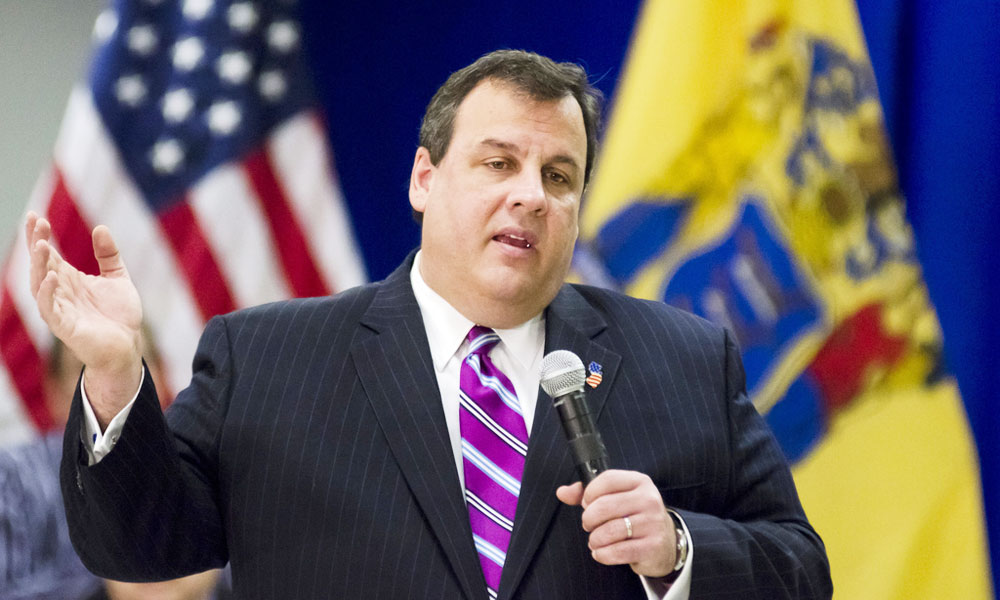
Chris Christie and Leading Amid Controversy
"Bridgegate" has some saying Chris Christie shouldn't lead the Republican Governors Association. The discussion has as much to do with ethics as politics.
Chris Christie is trying to mend fences. Or, shall we say, build bridges.
Late last week the New Jersey governor kicked off a cross-country trip in his capacity as chairman of the Republican Governors Association. He’ll lead meetings, take part in fundraisers—and most crucially for him, argue that he deserves to keep a leadership role that’s been tarnished in the wake of the George Washington Bridge scandal.
Should Christie be chair of the RGA given all the negative scrutiny? Last month, Florida Gov. Rick Scott avoided appearing with Christie during a visit. One GOP leader is calling for him to step down. Texas Gov. Rick Perry didn’t attend the kickoff event last Thursday. RGA is a $50 million fundraising powerhouse, and when people who ought to be your closest friends suddenly find better things to do, it inevitably raises questions about who should lead the organization.
Charismatic leadership is problematic. It can lead to the perception that the value of an organization rests with one person.
Much of this is political posturing, of course: Christie is considered a leading presidential candidate for the GOP in 2016, and “Bridgegate” offers a prime opportunity for his potential opponents to openly doubt whether he’s ready for the White House—and to use his RGA position as a way to raise those doubts. But it’s not just about political angling about Christie: If donors don’t trust the guy in charge—or feel he’s actively hurting the party—the discussion becomes as much about the RGA’s coffers and duty to meet its mission as it does Christie’s political ambitions.
Christie got where he is both in New Jersey and the RGA thanks in large part to his charisma—he built a reputation as a straight-talking, old-school, get-things-done leader. But charismatic leadership is problematic; it can lead to the perception that the value of an organization rests with one person. Christie’s predicament got me thinking about perhaps the most famous recent example of the problem with charismatic leadership in the nonprofit world. It involved the Central Asia Institute, a charity founded by Three Cups of Tea author Greg Mortenson, who in 2011 faced accusations of financially mismanaging CAI, in many cases to his own financial benefit. A board and staff shakeup ensued; in a legal settlement, CAI agreed to keep Mortenson from any financial management responsibilities, and he does not have a voting position on the board.
Mortenson’s fall from grace is also CAI’s: The goodwill and press that the organization received thanks to Mortenson’s bestselling books and speaking engagements are now things the charity will have to achieve in some other way. An article published last week by PandoDaily suggests similarly bad “optics” for the RGA. The New Jersey patronage culture that prompted “Bridgegate” could have a negative effect on the association: “Christie is under a microscope—and what goes unnoticed is going to instead be magnified, and become part of a narrative: Republicans—Republican governors do this,” a fundraiser told reporter Murray Waas.
Thus far much of the discussion about Christie and the RGA has involved a practical calculus about what the scandal means for RGA’s fundraising might and Christie’s political ambitions. But some ethical reckoning is in order here too. Every organization needs to consider whether the people it places in leadership roles are fit for the role. Usually this isn’t an issue: Associations tend to elevate people with proven track records. But it’s those track records that can lead organizations to turn a blind eye when something goes wrong. If a beloved exec or board chair at your organization was embroiled in a similar scandal, are you comfortable starting the conversation about whether that person should lead?
(photo by Bob Jagendorf/Flickr)






Comments